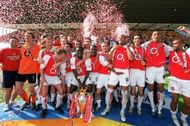Football is a team sport and the beauty of the game revolves around teamwork. However, once in a while some essential people emerge and become an integral part of the team and gradually the team begins to rely on that particular person’s performances for their success.
There have been several cases that the departure of certain players or managers has affected the team’s performances for some time or in some cases for a prolonged period. Let’s take a look at five such instances when a team never remained the same after the departure of some of its integral personnel.
1. Manchester United (post-Ferguson era)
Whenever it comes to a team losing its lustre in the modern days, the first example that comes to our mind are the Red Devils. Not so long ago, Manchester United were regarded as one of the strongest clubs in European football under the tutelage of Sir Alex Ferguson. Ferguson took over the reins of the club in 1986 and gradually developed them into one of the best clubs in English as well as European football.
The Scot went on to stay at the club for nearly three decades before hanging his boots at the end of United’s victorious 2012-13 season. Under Fergie, the Red Devils won lots of silverware which included 13 League Titles, 5 FA Cups, 4 League Cups, 2 Champions League Titles and the FIFA Club World Cup in 2008.
When Sir Alex left the club in 2013, Manchester United still had a number of quality players like Wayne Rooney and Robin Van Persie. However, under new manager David Moyes, United had a very disappointing 2013-14 season as they ended 7th in the league and subsequently missed out on European qualification.
As a result of the team’s poor performances, David Moyes was sacked and was replaced by Dutchman Louis van Gaal. Silverware eluded the Red Devils in the 2014-15 season as well as they ended fourth in the league despite the additions of Angel Di Maria and Radamel Falcao to their lineup. Their only consolation was a spot in the Champions League.
The current season has again been disappointing for Louis van Gaal’s side as they have ended 5th in the League. Furthermore, they were humiliated in Europe as a group stage elimination from the Champions League was followed by another swift exit from the Europa League at the hands of bitter rivals Liverpool. Their sole consolation has been winning the FA Cup. However, it’s a huge mountain to climb to regain their form during Fergie’s days.
2. France National Team (post- Zidane era)
In the late 1980s, France talisman Michel Platini called quits on his international career and soon became the manager of the national team. During this period, France already had established players like Jean Pierre-Papin, Luis Fernandez, Manuel Amoros, etc and soon had other star players like Didier Deschamps, Eric Cantona, David Ginola and Laurent Blanc.
Despite having such a talented squad, France was disapointing,to say the least as they failed to reach their full potential. Failure to qualify for the 1990 and 1994 World Cups coupled with a disappointing outing in the 1992 Euros sandwiched in between made for gloomy days south of the English channel.
Platini’s replacement Aime Jacquet dropped the likes of Cantona and Ginola and built his squad around younger players. One such youngster was Zinedine Zidane who scored a brace on his debut. Zidane soon became France’s most essential entity and propelled France to victory at the 1998 World Cup and Euro 2000. He then led France to the 2006 World Cup Final which they lost to Italy on penalties. Zidane announced his retirement from the national team following the World Cup.
Zidane’s departure from the national setup was a huge blow for France. However, they still had the likes of Thierry Henry, Patrick Vieira, Claude Makelele, William Gallas and Lilian Thuram in their side as they qualified for Euro 2008.
However, Les Blues had a very disappointing outing as they were eliminated in the group stages with losses to Italy and Netherlands. Makelele and Thuram announced their international retirements following the tournament.
France’s struggles continued as they had to qualify for the 2010 World Cup through a controversial play-off against Ireland. It didn't get any better as France had a disastrous tournament, exiting the 2010 World Cup in the first round, finishing last in their group.
Although France have been resurging in recent years, their performances in Euro 2008 and 2010 FIFA World Cup just depicts the huge gap left by Zizou’s departure.
3. Hungary National Team (post- Mighty Magyars era)
During the 1950s, Hungary was regarded as one of the strongest teams in world football. The team known as the Mighty Magyars revolved around the dynamic quartet of strikers Ferenc Puskas (who, at that time was regarded to be the best player in the world) and Sandor Kocsis, attacking half-back Jozsef Bozsik and inside forward Nandor Hidegkuti.
This team won the gold medal at the 1952 Summer Olympics at Helsinki and had reached the 1954 World Cup Final. Earlier, this team had comprehensively beaten England 6-3 at the Wembley in a match which was called the Game of the Century. During the 1954 World Cup, Hungary were in great form as they comprehensively beat every opponent they faced to make it to their second World Cup Final.
Prior to the final, Hungary had a 31-match unbeaten streak and they had won every game in the World Cup by a margin of at least 2 goals. However, they lost 3-2 to West Germany in spite of being 2-0 up and as the rest as they say, is history.
Soon after the World Cup Puskas and Kocsis retired from the national team and the captaincy was passed from Puskas to Hidegkuti. In the 1958 World Cup, Hungary had a disappointing outing as they bowed out in the group stages.
After the generation of the Mighty Magyars fizzled out, the Hungarian side was never the same. The East European country later made it to the quarter-finals of the 1962 and 1966 World Cups and the semifinals of Euros 1964 and 1972 but they didn’t have the same killer instinct as they possessed during their glory days..
They struggled during the late 70s and 80s and after the World Cup in 1986, failed to qualify for any major tournament until Euro 2016. The current Hungarian side has ended their 30-year absence from a major tournament but it’ll take more than a Herculean task to replicate their performances of the 1950s.
4. Liverpool (post- Benitez era)
Liverpool weren’t exactly having the best of times during the 1990s. They failed to replicate their legacy they had created under Bill Shanley and Kenny Dalglish over the earlier years. The most they could do was win a cup treble in 2001 under Gerard Houllier that included the FA Cup, League Cup and UEFA Cup.
The Frenchman was replaced by Rafael Benitez who brought Liverpool back on the map in European football. In his first season in charge, Liverpool won the 2004-05 Champions League after scripting one of the most memorable comebacks in football history against Italian giants AC Milan in the final.
He further guided Liverpool to an FA Cup win in 2006 and another Champions League Final in the 2006-07 Champions League which The Reds lose to their 2004-05 final opponents AC Milan. Under the Spaniard, Liverpool had their best ever Premier League finish since its inception as they ended runners-up to Manchester United with 86 points. Benitez left at the end of the 2009-10 season and this marked the beginning of a drastic downfall for The Reds.
Under Roy Hodgson and later Kenny Dalglish, they ended the 2010-11 season in 6th position after being in the relegation zone for some time; something which would later lead to Hodgson resigning.
The 2011-12 season saw the return of Kenny Dalglish but he failed to live to people’s expectations as they slumped to their worst ending in the League since 1994 as they ended eighth. Victory in the League Cup and an FA Cup couldn’t prevent Kenny Dalglish from getting the sack and he was replaced by Brendan Rodgers.
Rodgers was in charge of the club for nearly three-and-a-half seasons before being dismissed in 2015. Under him, Liverpool came very close to winning the League in the 2013-14 season before spilling the beans in their last couple of games to finish second.
Rodgers’ replacement Jurgen Klopp has so far been good in resurging Liverpool and thanks to his guidance, Liverpool made the final of the Europa League despite of a disappointing league finish. However, it is still a very long way to go in order to replicate the form they had during Benitez’s time at the helm.
5. Arsenal (post- Invincibles era)
Arsenal have been one of England’s finest clubs over the years. However, their most successful era came during the late 90s and mid-2000s courtesy of the appointment of Arsene Wenger as their manager in 1996. Wenger, who has been Arsenal’s manager for nearly two decades fortified the Arsenal squad by bringing in a wide variety of foreign players like Patrick Vieira, Jens Lehmann, Thierry Henry, Freddie Ljungberg, Robert Pires, etc.
A number of these players alongside the likes of Dennis Bergkamp, Sol Campbell and Ashley Cole were the forefront of perhaps the greatest team ever in Arsenal and arguably Premier League history.
Arsenal were in a great run of form through the late 90s as they won a League and FA Cup double during the 1997-98 season and this was followed by three runner-up finishes in the League before they won it in again in 2002. In the 2002-03 season, a 3-2 home defeat to Leeds ensured that Manchester United would win the title.
Little did Arsenal realise that that heart-breaking loss would be their last defeat in the league for over a year as they would go the next season undefeated. This legendary side of the 2003-04 season came to be known as “The Invincibles”. Thierry Henry ended up being the top goal scorer of the league. A lot of players from this team were instrumental in Arsenal reaching the 2005-06 Champions League Final where they lost to Barcelona.
However, after the 2003-04 season, The Invincibles slowly began to fall apart with the departure of many players. It began with club captain Patrick Vieira’s departure in 2005, followed by the retirement of Bergkamp a year later and by 2007, most of the Invincibles team had left Arsenal.
Although Arsenal’s performances haven’t diminished much, they have never come close to reaching the heights of the 2003-04 season. The 2003-04 League title would be also turn out to be their last league title as they have failed to win the League ever since. Their performance in European competitions has also been far from convincing as their best performance since 2006 has been reaching the semifinals during the 2008-09 season.




